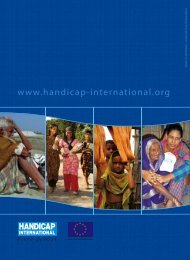Full page photo print - Harvard Law School Project on Disability
Full page photo print - Harvard Law School Project on Disability
Full page photo print - Harvard Law School Project on Disability
You also want an ePaper? Increase the reach of your titles
YUMPU automatically turns print PDFs into web optimized ePapers that Google loves.
privacy, pers<strong>on</strong>al integrity, the home, and family while participating in that particular life activity.<br />
Variati<strong>on</strong>: Role play both best- and worst-case versi<strong>on</strong>s of c<strong>on</strong>fr<strong>on</strong>ting these barriers,<br />
illustrating ways that such barriers might be addressed.<br />
3. discuss:<br />
• What are the c<strong>on</strong>sequences when people with disabilities do not enjoy respect for their<br />
privacy, pers<strong>on</strong>al integrity, home and family? To the pers<strong>on</strong> with disability? To society as a<br />
whole?<br />
• Which barriers have the greatest effect <strong>on</strong> people with disabilities?<br />
• What can be d<strong>on</strong>e to eliminate these most significant barriers?<br />
ensuring privacy and pers<strong>on</strong>al integrity of travelers with disabilities<br />
Although security restricti<strong>on</strong>s and checkpoints have been a part of air travel for many years,<br />
their use and rigor has increased in recent years, largely in resp<strong>on</strong>se to terrorism and other<br />
related c<strong>on</strong>cerns. The result is that security checks at airports are often more invasive than they<br />
used to be, with many airports around the world requiring travelers to undress to some degree,<br />
and/or submit to searches of their luggage. In the U.S., this led to c<strong>on</strong>cerns from the disability<br />
community that the rights to privacy and pers<strong>on</strong>al integrity of travelers with disabilities were<br />
being violated, either as a result of the security measures themselves, or as a c<strong>on</strong>sequence of<br />
security staff being unaware of the specific needs of travelers with disabilities.<br />
To address these c<strong>on</strong>cerns, the Nati<strong>on</strong>al Council <strong>on</strong> <strong>Disability</strong>, the Federal Aviati<strong>on</strong><br />
Administrati<strong>on</strong>, the Transport Security Administrati<strong>on</strong> (TSA) and the disability community<br />
worked together to develop guidelines and training programs that would address the rights<br />
of travelers with disabilities, as well as security c<strong>on</strong>siderati<strong>on</strong>s. The trainings are intended to<br />
raise awareness of security staff of the rights and needs of travelers with disabilities, as well<br />
as ensure that they know what the guidelines are and how to implement them. To ensure that<br />
travelers with disabilities are aware of their rights, the TSA has provided informati<strong>on</strong> <strong>on</strong> its<br />
website, so that travelers can prepare themselves before they travel. Should travelers feel that<br />
their rights have been violated, they can c<strong>on</strong>tact the TSA’s Office of Civil Rights. The following<br />
are excerpts of some of the rights and resp<strong>on</strong>sibilities addressed in the guidelines:<br />
• If a pers<strong>on</strong>al search is required, you may choose to remain in the public area or go to a<br />
private area for your screening. If you refuse either opti<strong>on</strong> you will not be able to fly.<br />
• You should be offered a private screening before the beginning of a pat-down inspecti<strong>on</strong> if<br />
the pat-down will require the lifting of clothing and/or display of a covered medical device.<br />
• You may request a private area for your pers<strong>on</strong>al search at any time during the screening<br />
process.<br />
• Your compani<strong>on</strong>, assistant, or family member may accompany you and assist you during<br />
a private or public screening. After providing this assistance, the compani<strong>on</strong>, assistant, or<br />
family member will need to be rescreened.<br />
• You may request a pat-down inspecti<strong>on</strong> in lieu of going through the metal detector or being<br />
handwanded. You do not need to disclose why you would like this opti<strong>on</strong>.<br />
• If you have a disability, c<strong>on</strong>diti<strong>on</strong>, or implant, that you would like to remain private and<br />
c<strong>on</strong>fidential, ask the Security Officer to please be discreet when assisting you through the<br />
screening process. 2<br />
2 “Tips for the Screening Process: Travelers with disabilities and medical c<strong>on</strong>diti<strong>on</strong>s.” Transportati<strong>on</strong><br />
Security Administrati<strong>on</strong>. http://www.tsa.gov/travelers/airtravel/specialneeds/editorial_1567.shtm<br />
102 human rights. yes! aCtiOn and adVOCaCy On the rights Of persOns with disabilities




